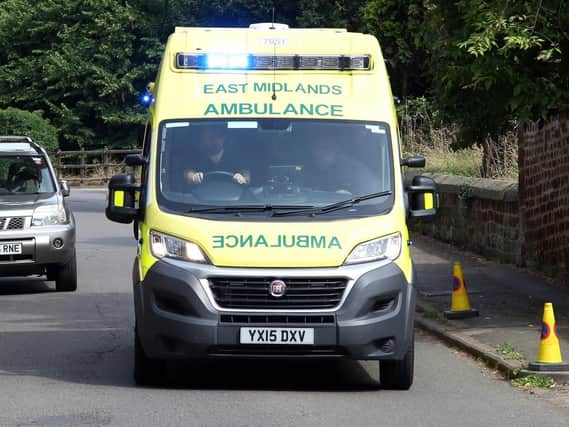Ambulance strike day in Lincolnshire cancelled – but union plans more for new year


The GMB trade union has informed its members it has rescheduled the strike action for January 11, 2023.
The national pay dispute saw GMB members at East Midlands Ambulance Service (EMAS) take strike action along with those in eight other trusts around the country over a 24-hour period, from 6am on Wednesday December 22.
Advertisement
Hide AdAdvertisement
Hide AdBen Holdaway, EMAS Director of Operations, said: “The GMB announcement today is welcome as it removes some of the anxiety all our staff would have had around the action planned for the 28th. It will also provide us with time to review the action taken this week and continue local discussions with our trade union colleagues to prepare for the new strike date of Wednesday January 11, 2023.
“Wednesday was an immensely challenging day this week, however the regional plans drawn up at EMAS and the huge effort behind the scenes and across the wider NHS to minimise the impact of industrial action on patient safety was appreciated.
“Our approach was also supported by the public who responded to the plea to use services wisely and to make their own way to a treatment centre or hospital if safe to do so; of course, these are behaviours that should continue as the NHS continues to face significant pressures.”
During the strike period this week, emergency 999 call numbers reduce by a third (33%).
Advertisement
Hide AdAdvertisement
Hide AdMr Holdaway added: “I am grateful to our colleagues both on and off the picket lines, and in the trade unions, for their professionalism and collaboration throughout industrial action, to ensure we could continue to respond to patients in need of an emergency response.
“The NHS remains open and people are asked not to store up their health conditions or soldier on until after the four-day Christmas Bank Holiday weekend. Doing so may result in very high demand which our services will find very challenging to manage, particularly so given the huge rise in flu hospital cases and staff sickness across the country reported this week.
“Please access care when you need it and continue to support the NHS by using services wisely – people should only call 999 if there is a risk to life, eg cardiac arrest, unconscious or catastrophic bleed, or if seriously ill or injured eg stroke or a serious traumatic injury. Ambulances will be sent to patients where clinically appropriate, eg where the life-saving equipment and skills of the clinicians on board are required.
“We will continue to work with trade union colleagues closely to keep patients safe in any future periods of industrial action and continue to fully respect the right of NHS staff to take lawful and peaceful action. However, we urge national employer representatives and trade union colleagues to proactively engage and reach a negotiated settlement to the dispute as quickly as possible.”
Advertisement
Hide AdAdvertisement
Hide AdThe government’s Health and Social Care Secretary Steve Barclay commented on the union’s decision: “While union members will not be going ahead with strikes over Christmas, we are disappointed they have announced further co-ordinated strikes in January to cause maximum disruption at a time when the NHS is already under extreme pressure.
“Ambulance staff on picket lines have been raising concerns about working conditions and handover times, so it is important to use this extra time to keep talking about how we can make the NHS a better place to work. However, the unaffordable pay demands of unions would mean taking money away from frontline services and cause further delays to care.
“Strikes are in no one’s best interest, least of all patients, and I urge unions to reconsider further industrial action to avoid an even greater impact on patients.”
Ambulance trust workers had voted to strike over the four per cent pay award advised by an independent pay review body, which the union sees as a real terms pay cut.
Rachel Harrison, GMB National Secretary, said:
Advertisement
Hide AdAdvertisement
Hide Ad“Ambulance workers are overwhelmed by the support received from the public.
“In trying to smear decent, hardworking ambulance staff, the government is showing just how out of touch it is with reality and the people of our country.
“Across the nation, even when ambulance workers were on strike, they've run to emergency calls to help those who need it.
“Instead of issuing ever more extreme statements that offend both NHS staff and the public, the government needs to grow up and get round the table. It’s time to talk pay now.”
